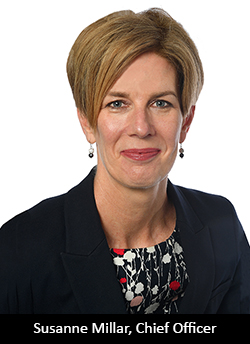Message from Susanne Millar - Partnership Matters - October 2021
Our Health and Social Care Partnership (HSCP) is undertaking the biggest change in a generation to build a health and social care system in Glasgow now that’s fit for the future. We’re working with our partners to transform the way we do things, prioritising early intervention and community support where they will help to prevent more serious and critical situations happening further down the line. Whilst this has been happening across a range of work within our HSCP, this approach is the focus of, and being driven through, our Maximising Independence Programme. We’re having ongoing conversations with a wide range of people to understand more about what matters to them, and how we can all work together to support people to maintain their independence and wellbeing safely in their communities for as long as possible. We kick off this October’s Partnership Matters Briefing featuring an update on the programme.
‘What matters’ to our care experienced people is also a central tenant within Scotland’s ‘The Promise’. In October 2016, Scotland’s First Minister announced an independent root and branch review of care to be shaped by the voices of children, young people, adults and professionals with experience of care. Around 5,500 of these people informed the lessons, outcomes and recommendations of The Independent Care Review, which concluded in February 2020 with the publication of The Promise. The Promise is Scotland’s pledge to do what people told us that we needed to do and to make things better for our children, young people and their families who need our help and support, so that every child grows up loved, safe, respected and able to realise their full potential. This month we feature work we’re doing in Glasgow with partners to #KeepThePromise.
This month we also feature how our HSCP’s Supported Employment Service is working with other Glasgow City Council services to deliver a new supported work experience programme for young people with autistic spectrum conditions, helping them to live more independently and achieve ‘what matters’ to them in the world of work. The programme is being funded by the Scottish Government’s Young Person’s Guarantee, and it supports young people with autism to improve the transition into Modern Apprenticeships.
We wrap up our features with more information on how we’re helping to support the mental health of people from the Deaf community whose first language is British Sign Language (BSL). The prevalence of mental health issues is four times higher for people in the Deaf community than the hearing community because of issues like isolation, social exclusion, discrimination and stigma caused by deafness and communication barriers. Evidence has also shown that accessing Mental Health services is difficult for individuals within the Deaf community, with people often presenting to the service during a mental health crisis. Our HSCP has recently joined in delivering a new ‘test of change’ service to support people in the Deaf community with their mental health recovery through a dedicated Deaf Mental Health Peer Support Worker.
As in previous briefings, we continue to include recent news articles available on our HSCP’s website and upcoming events and meetings. You can read them by selecting their relevant link.
An update on how we continue to respond to and manage the impact of the COVID-19 pandemic on our health and social care services is also provided, and Mike Burns, our Assistant Chief Officer for Children’s Services and North East Operations, talks more in our Senior Management Team (SMT) video about how we’ve been continuing to support children, young people and their families during the pandemic.
Although there were spikes last month in COVID-19 cases and they remain high, I’m sure you’ll agree that it’s welcome news that we’ve been seeing the number of cases in our local communities decrease. While it’s taking time for this to have a positive impact on the pressures we face across our health and social care system, we’re moving in the right direction of starting to feel that benefit, and hopefully our pressures will subside.
But we must remember that COVID-19 is still very much with us and pressures continue, and whilst we continue to make gains, we can’t become complacent and let down our guard. We must continue to do all that each and every one of us can do to suppress the virus, especially as we’re moving into the winter months and all the additional challenges they bring. It’s so important that we take opportunities to get vaccinated, participate in testing, self-isolate when required, continue to wear face coverings as appropriate and follow other Government and Public Health measures.
As you may be aware, we’re in full swing of offering the COVID-19 vaccine booster to eligible people who received their COVID-19 vaccination earlier in the year. It’s being delivered by Health Boards across the country alongside the flu vaccination, and eligibility is based on what the Joint Committee on Vaccination and Immunisation (JCVI) recommended. The vaccine booster dose will help extend the protection gained from the first two doses and give longer-term protection. More information about the booster and how it’s being administered is available on the NHS Inform website.
As ever, and I can’t say it enough, I remain grateful and thankful to our staff and partners, who continue to support the health and social care needs of our city at a time when they’ve needed us the most. We couldn’t do it without them, and they’re what makes Glasgow uniquely Glasgow. Thank you.
Susanne

